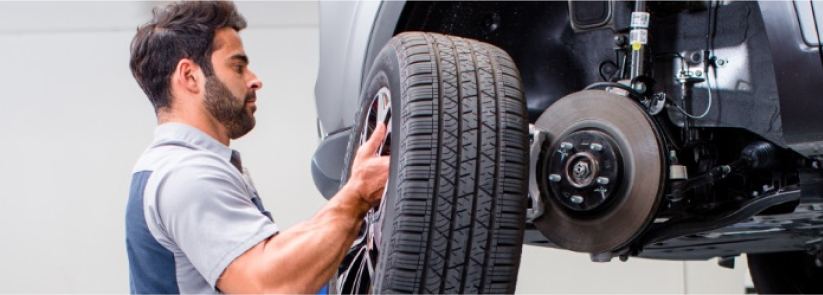Unlock Performance: Specialist GMC Tire Service at Morris Tires
Wiki Article
Tire Solution: The Effect of Weather
When it comes to guaranteeing optimal efficiency and safety and security on the road, understanding the impact of weather condition problems on tire service is essential. GMC Tire Service. In this conversation, we will check out the elaborate relationship between climate conditions and tire service, losing light on the importance of weather-specific tire upkeep practices and factors to consider.Warm and Tire Performance
When exposed to high temperatures, tires experience modifications in performance that can considerably affect automobile security and handling. The heat created from prolonged driving or hot climate problems creates the tire rubber to soften, leading to reduced tread life and increased wear.
Winter Impacts
Cold weather problems can have a significant effect on tire efficiency and security. As temperatures drop, tire rubber can set, causing lowered grip on icy or snow-covered roads. In winter, tires may additionally lose air stress a lot more swiftly, which can affect handling and fuel efficiency. Additionally, chilly temperatures can cause tire sidewalls to stiffen, boosting the risk of damages from fractures or other roadway risks.To alleviate the results of winter on tires, it is essential to routinely check tire stress and inflate them to the manufacturer's recommended degrees. Making use of wintertime or all-season tires developed for winter problems can additionally improve traction and hold on icy or snowy roads. Proper tire maintenance, including routine assessments for wear and damage, becomes also more crucial during cooler months to ensure optimal efficiency and safety.
Rainy Conditions Impact
Tires with damaged treads are extra susceptible to hydroplaning, where a layer of water develops up in between the tire and the roadway surface area, leading to loss of grip. To battle this, motorists must routinely inspect their tires for adequate walk depth and consider spending in tires particularly created for wet problems.Moreover, wet weather condition can also decrease exposure, making it challenging for motorists to see the roadway in advance clearly (GMC Tire Service). In such conditions, it is important to change driving rates as necessary and maintain a risk-free adhering to distance to permit unexpected quits. Correctly inflated tires can likewise assist in keeping control on damp roads by giving better handling and grip
Snow and Tire Security
Snow-covered roadways pose unique difficulties for chauffeurs, highlighting the relevance of appropriate tire option and upkeep. When driving in snowy problems, having the ideal tires can make a substantial distinction in safety and security and performance. Winter season tires are made with unique rubber compounds and walk patterns to provide much better grip on snow and ice contrasted to all-season tires. The deeper treads and sipes of wintertime tires original site help hold the road better, reducing the danger of slipping and sliding.
Additionally, vehicle drivers must think about setting up tire chains in extreme snowy conditions. Tire chains give added grip by gripping the snow and ice, enhancing security and control. Nevertheless, it is essential to adhere to supplier directions when utilizing and installing tire chains to stop damage to the tires and vehicle. By choosing the best tires, maintaining correct inflation, and thinking about additional traction aids like tire chains, vehicle drivers can enhance their security when browsing snow-covered roads.
Weather-Related Tire Upkeep
Weather-related tire maintenance incorporates a variety of methods intended at their website ensuring optimum tire feature and durability in various weather condition scenarios. One vital element of weather-related tire upkeep is tire pressure regulation. Checking tire tread frequently and replacing tires when step wear reaches a certain depth is important for keeping grip and stability in adverse weather condition.
Conclusion
In final thought, weather problems have a significant effect on tire efficiency and safety and security. From heat affecting tire pressure and use to cool weather condition decreasing traction, it is crucial to consider the climate when preserving and using tires.In this discussion, we will see it here discover the intricate relationship between weather condition problems and tire solution, losing light on the relevance of weather-specific tire upkeep practices and factors to consider.

Report this wiki page